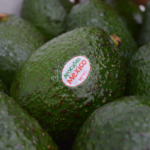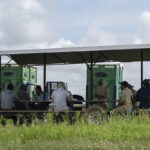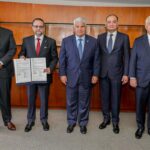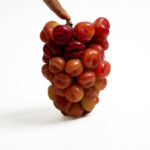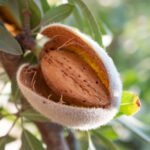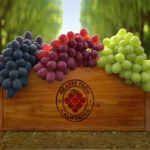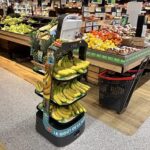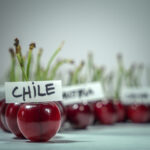Westfalia’s global avocado rise

“We’re the leading importer of avocados into Europe and we’re expanding. Last year we opened the USA business, we acquired a business in Peru and we’re not going to stop at that. We’re on a roll and we’re enjoying what we’re doing,” says Claus Lippert, CEO of HMH, owner of the Westfalia Fruit Group. 
As we speak during Fruit Logistica in Berlin, the global executive is decidedly optimistic.
He prefers to keep a low profile, espousing a practical mentality. The business has now reached a point where Westfalia’s extending reach is hard to ignore.
Another of the group's more recent updates has been its project in Mozambique. Lippert says the initiative is nearly complete and has been undertaken in line with the group’s longstanding legacy of social and environmental sustainability, which he claims Westfalia’s founder Dr. Hans Merensky was preaching long “before it became fashionable”.
But growing avocados in Mozambique is just one piece of a larger puzzle. In addition to initiatives in the USA and Peru, it is also in a joint venture with Subsole (called Westsole) in Colombia and is doing tests in Asia with the end goal of hopefully supplying the region someday.
“China has grown phenomenally over the past three years. Of course there’s excessive exuberance about it and everybody is pouring into China,” he says.
“There are times when the market crashes because of that, but that also has its positives in the sense that the fruit is cheap, more people get exposed to it and you get better penetration. So there are always opportunities in times of difficulty,” he says, adding that Westfalia is still considering its options in China."
Lippert is excited about the prospects for Colombian avocados even though the industry has made some mistakes along the way.
“We are considering building a second packhouse, we are expanding our orchards and we are looking at setting up our own nursery. This will be a clonal nursery because proprietary clonals have better resistance to root disease.
“We’ve exceeded our targets in terms of the first packhouse – it’s running flat out, we’re exporting a lot, we’re growing each year, and we need to be in other regions too.”
Because of the lucrative window Colombia possesses for the European market, he says some growers haven’t done pre- and post-harvest treatment properly.
“Because Colombia has hype at the moment, a lot of the bigger growers try and export independently. All our growers have accreditations, which is not necessarily true for competitors. These are lured by promises from indiscriminate importers.
“As a result, this past season has been quite difficult for quite a few Colombians. So there’s actually a concern from the Colombian industry as it could affect their reputation.
He emphasizes Westfalia believes in an inclusive model so producers can share in the growth of the industry and its success. For this reason Westfalia has invested considerably in supporting the growers with practical horticultural advice and with the requisite accreditations.
“In southern Africa, we work with more than 70 different growers and through that can supply more consistent programmes. Our retail customers can rely on the fact that we keep our promises and that we deliver the programmes and quality that we say we’re going to deliver.
The executive expects “consistent growth” in Europe, where last year the group opened up an office in Vienna, Austria, to serve Eastern European markets.
“The stalwarts of the greenskin varieties are Eastern Europe but they are also converting to Hass. This is primarily due to the thicker skin with less bruising, so you have less wastage and a better consumer experience. The fact that Hass turns black when it gets ripe makes it easy for the consumer to identify ripeness.
“I think the Eastern European markets have a lot of scope – avocado is not traditional in their culinary portfolio, but as the world becomes more globally open, those customs do change.”
Bringing European avocado market lessons to the U.S.
With a much higher level of consumption, it may sound counterintuitive that the US market could learn from Europe, but this is what Lippert believes.
“I think we’ve started from humble beginnings with a small team [in the US]. We are the new players on the block,” he says.
“There is a differentiation opportunity in terms of the ripening, especially in the merchandising with retailers.
“The challenge is that the fruit gets ripened, then put by the retailer on a shelf which is not refrigerated or cooled, they’re put on a heap, they build up energy and start getting warm inside, and there’s a lot of wastage.”
This means there’s a lot to be done to improve ripening practices in North America, according to Lippert.
“They have been spoilt by having close access from Mexico, and so the quality selection that is required for the US has not been of the same standard as it has been in Europe,” he says.
“That’s why Mexico finds it difficult coming to Europe because the quality is not the same – if you ship it for two or three days there’s a big difference to shipping it in 20-30 days, and then all your quality aspects come out and you see the gray pulp developing, the bruises exhibiting.
“There is a specialization that is required and we are taking it one step at a time. We have acquired a building north of LA in which we’re putting in ripening rooms, bringing in the technology from Europe.”
Westfalia Fruit Americas president Art Bruno, who was chief operating officer and chief financial officer at Calavo Growers for almost 13 years, says the big focus points now is on building infrastructure and relationships with Mexico.
“We have a really good California grower base and that’s going really well. They have a short season but we’re getting lots of rain in California and that’s going to bode well for the balance of the season as well as setting up the crop for next year,” he says.
“We think the infrastructure activities strategically aligned by Westfalia in South America are going well – the Peruvian program and the Colombian program.
He highlights that, as Westfalia is a grower and takes a “tremendous amount of pride” in taking good care of orchards to get consistent quality, the group is already getting traction from the customer base which can see the benefits.
And his thoughts on the US-EU comparison?
“There’s no question – I think the ripening and value-added services that are involved in the EU are a little more developed than we have in the US market.
“I think that will improve.”
















